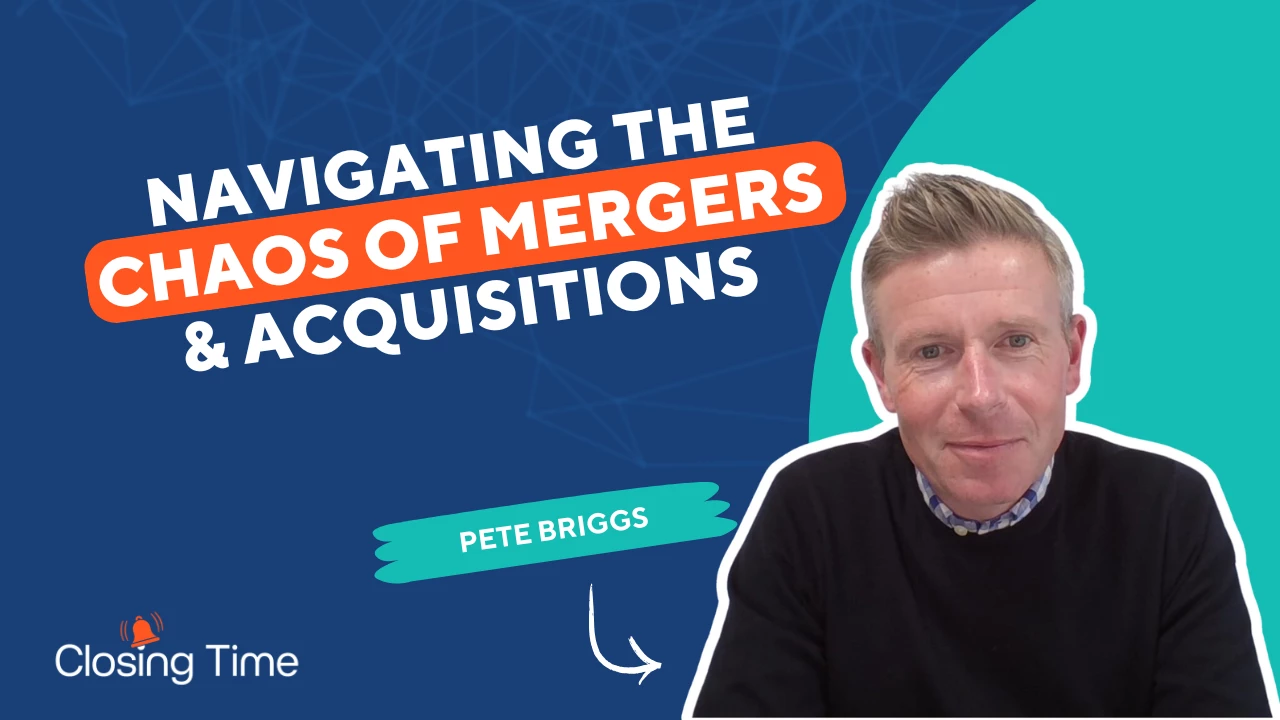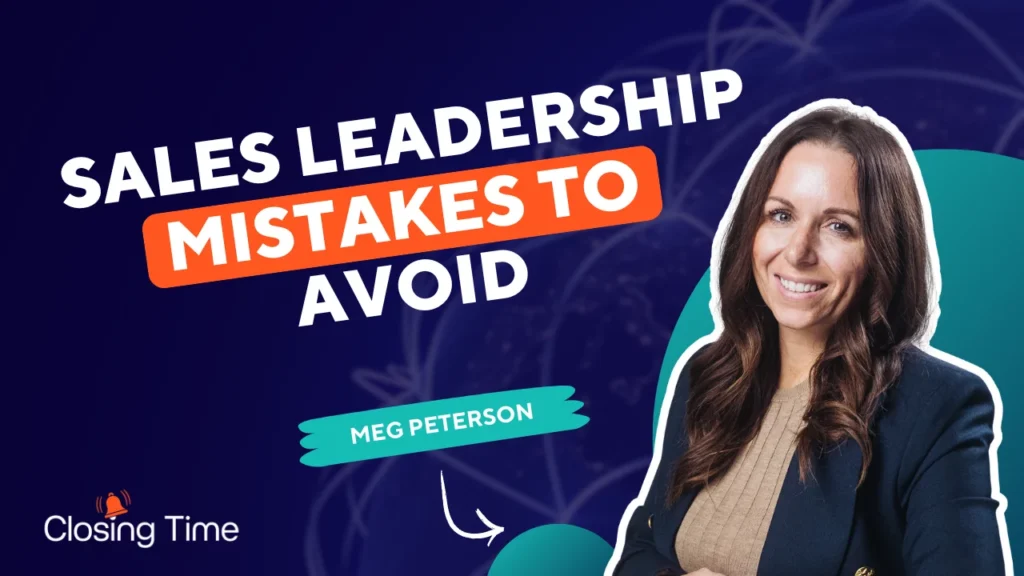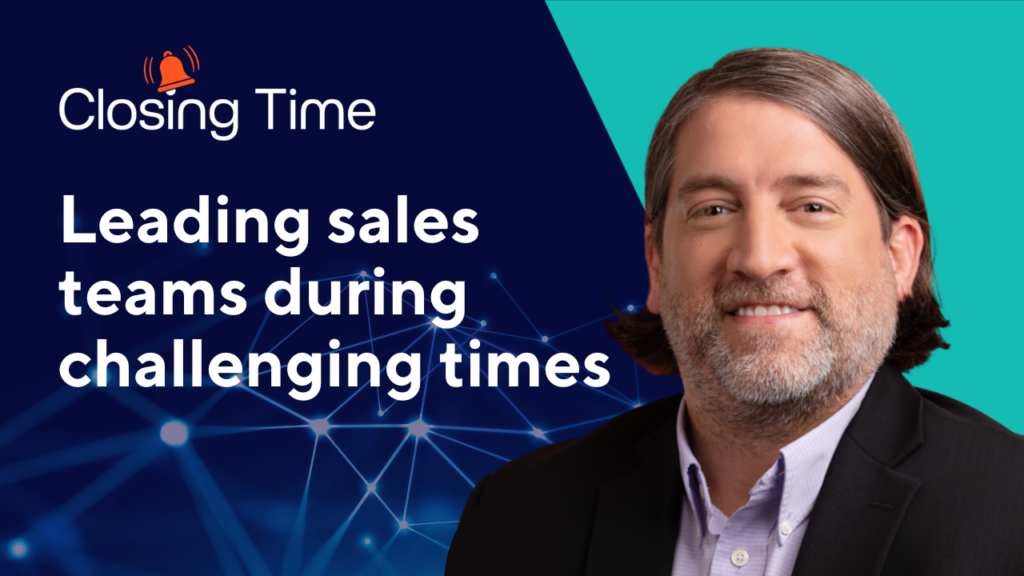Is a merger or acquisition in your future?
Learn how sales leaders can navigate their teams through the ups and downs of M&A.
In this episode of Closing Time.
Thanks for tuning into Closing Time, the show for go to market Leaders.
I’m Val Riley, VP of marketing for Unbounce and Insightly.
Today I’m joined by Pete Briggs.
He is sales director of Epassi, a mobile payments provider for employee benefits.
Welcome to the show, Pete.
Thank you for having me, Val.. Pete.
We actually worked together in a past life through an acquisition
in the ed tech space.
So I know you’ve got firsthand experience in this.
Let’s go step by step and start with pre-merger,
because a lot of times the staff isn’t privy to the M&A talk.
But that grapevine, that rumor mill is pretty active.
So how do you handle that situation, that pre-merger feel with salespeople?
Well, I suppose it’s worth saying there’s not a magic answer to this.
But certainly,
trying to get ahead of the rumors is probably a good idea.
Because we all know that,
a narrative will develop one way or the other.
So you’re better off trying to lead the narrative in some way.
And I think I and maybe we found that,
being able to share what you could share in a sort of regular and consistent way
about any upcoming change definitely helped people,
prepare themselves for the future and feel like that
they were, moving forward in a way
that wasn’t necessarily threatening to them at the time.
You. Exactly.
Because the worry is the the silence can create
a whole series of narratives which,
which could undermine whatever you’re trying to achieve at the time.
Exactly.
Because in a lot of ways, salespeople are more autonomous
than maybe other roles in a company.
Meaning that they’re kind of responsible for their own quota and their destiny.
So it also means that it can be easier for them
to just leave for another role if they sense something is changing.
So is there a strategy for kind of retaining a players
during a merger or acquisition?
Yeah, and that’s probably multi-faceted.
So you’re right, you know, as a salesperson,
any form of disruption in your business probably isn’t good news,
because that’s probably going to make it harder for you
to make your number that month or that quarter.
But the whole thing, if we think about the concept of,
a merger and acquisition, a frightening statistic
that I read was in HBR,
that between 70 and 90% of all acquisitions fail,
so they end up in not delivering the anticipated benefits
that whomever was buying and selling thought that would occur.
So, you know, from a leadership point of view, you’ve got a job to do.
Whatever the conditions you go to, try and lead a group, potentially a new group,
a merged group, through whatever change and help people succeed.
So you yourself have to think about
how are you in all of this?
Because you’re not immune from change.
It’s a change for the team. It’s a change for you.
You’re not sure it’s going to be great or
how it’s going to play out.
So you have to go into it very eyes wide open, I think.
And, it’s quite easy to get caught up in the hype cycle.
All the talk of synergies and cultures aligning and all of this stuff,
when the reality is it’s probably a financial
transaction and it’s about making money for somebody.
And if there’s a sort of a
link with culture, then let’s say it is to try and get everybody excited.
But you have to be grounded, but you have to
then think about your own self management.
You know, your top performers or any of your performers, really.
You are somebody that they’ll look
to for some guidance on stability.
How you show up and behave is going to kind of set
the tone for how they feel about what’s going on to a degree.
So I always think you don’t really know if you’re good at captaining a ship
until you’ve sailed through a couple of storms, and the chances are
that this is probably going to be some kind of storm.
Maybe big or small.
So you have to get yourself ready for that journey.
In terms of the people themselves and the team,
whatever’s going on around them, you know,
maybe they’re really bought into the company,
maybe they aren’t,
but they’re probably quite bought into themselves and probably bought
into themselves over and above anything the company will ever say or do.
So for me, if you can help people explore what they’re going
to get out of this current situation and help them really focus on their own
growth, it’s a great way to retain focus
in what could be a chaotic situation that they’re in.
I always, my phrase. I use is, make work work for you.
Very few people have a job that is going to be forever.
So you’ve really got to make sure that, yeah, the company’s getting what they want
out of you, but you’re getting what you want
out of the company that could be growing your skills.
It could be, getting to work on a new project, learning a new technology,
whatever it might be, that if you then decide you want to leave, you know what?
You’re in a really great spot and you’ve got a
bunch of really great stories that you can take to your next job
that’s going to help you make that step up.
So helping people explore what they want out of a situation is a real nice
way to keep people kind of on the ground and focussed on moving forward.
Yeah.
I like that, Pete.
Because I feel like it certainly applies to salespeople.
But really, any department in a in a merger or acquisition,
any individual contributor, having them come in with a mindset of, okay,
what can I draw from this experience, even if the outcome isn’t perfect for me?
But I’m going to learn something here.
So let’s think about those one on one meetings you’re having.
It’s right after a merger or acquisition is announced.
Tell me how you would recommend
communicating with the next level managers and then potentially as a leader,
doing skip level meetings or checking in with different members of the team.
What does that look like practically?
Yeah, there’s a few different things you can explore, and
you know that there’s the individual dynamic,
and there’s between your managers and potentially the managers, down
to the to the people, the individual contributors.
And then there’s the group format as well.
And I think the group format is really important
in these type of periods, as well as the one on one,
in the sense that you want to kind of
be able to take the temperature of the room quite frequently.
And a lot of us work in hybrid or remote type environments these days.
So it’s not like I get to kind of see how you are when you walk in
so that group meeting can be really, you know, a little
and often so that we can have a meeting, we can stay focused on performance.
It’s probably a forecast call or something
similar could be daily, could be twice weekly or whatever.
But it’s about your chance to both stay focused on performance,
get people to talk about their own performance
so that there’s a sense of. I still have to deliver and commit.
But equally, you can weave in, a little bit of humor or a lot of humor
if you can, and trying to kind of retain that human connection.
Because whatever’s going on
is probably not as serious as it can feel.
And sometimes we can kind of get wrapped up in something being more serious
than it is, and a little bit of humor and things like that can help
kind of grease the wheels.
In terms of the one on ones,
I’m a big fan of having different kinds of one on ones through, say, a month.
There should be hopefully one that’s really focused on the individual,
like the how are you?
How are you progressing
against the things that are important to you, to grow your skills or whatever?
Then there’s the sort of performance based 1 to 1 where
we’re really getting into the numbers and seeing how you’re tracking
towards something and how your plans are going to support that.
Then there’s the coaching interaction as a third one where we’re
we’re really focused on a skill development type meeting.
And just because everything’s changing around us
doesn’t mean that we should change how we do business.
So consistency and keeping up with the cadence of meetings
that don’t just kind of it’s very easy to fall into the trap of
just doing the how are you one to ones which can be very useful,
but you might not end up talking
about anything to do with the job today or tomorrow this month.
So you need to have the performance aspects as well,
and really don’t lose sight of the fact that, you know what,
whatever the situation is, we’re here to do a job.
We’re paid money to do something very specific, which is make sales.
So we have to really stay focused on that
irrespective of what might be going on around us.
So we have that lead up to the merger acquisition.
We have the big announcement day, right?
And then the next three months or so, just feel like it’s just full of questions.
Sometimes we have brand convergence.
Sometimes we have side by side brands.
There’s tools to reconcile metrics, cross
reporting, cross-selling if applicable.
So just to kind of talk through how you kind of keep
the team heads down on the goals during that time,
because it really feels like there is so many distractions.
Yeah.
And not just for the team, but for yourself as well.
And it comes back to that point of,
yeah, just
because you’re leading a team doesn’t make you any less emotional,
doesn’t make you any less anxious, doesn’t make you any less human.
Really?. So you have all those same emotions,
and some really weird things can happen in that period.
Things that you didn’t expect.
It’s new people, it’s new cultures.
And, you know, so the first thing is you’ve
kind of got to realize that. I basically got a new job,
but that can be really hard because you have all the
I don’t want to call it baggage, but you have the experience from before,
and suddenly that maybe doesn’t count for as much as it did before.
Right?
And literally really strange things can happen.
You could end up working for someone who is much less experienced than you,
or you perceive them as much less capable, but that’s kind of how it is now.
So and you have to be able to self-manage in that scenario
to then be able to talk to the team about that same dynamic.
And in a way, you know, you can’t share everything,
but sometimes being open with
how you are coping and moving through a difficult period
can be a great way of, A, showing somebody that it’s it’s okay to have
anxious feelings or whatever, but there is a way through it
and that we together can kind of navigate it as a team.
And you know what?
If you don’t know something and it looks a bit strange, then
you know, it’s perfectly okay to be honest about that.
And to accept that it’s an imperfect situation.
I think leadership can sometimes fall out of step with, with the teams
when you’re just constantly on, everything’s perfect, everything’s great.
You know, this is just an amazing situation for us all.
And if anybody else doesn’t feel like that, that level of trust
just kind of starts to disappear.
I think that’s a great point, Pete.
Because as a leader, you know you’ve got a new job.
Sometimes it might not be a job that you actually wanted.
Absolutely, absolutely.
One possible benefit of coming off a merger acquisition is
you might get an opportunity to examine the toolset of the other company
and make some changes in your own or as you merge,
kind of have like a best of breed tool set.
have you had experience with that?
Yeah,. I think, and probably a kind of mixed one.
So systems, under the sort of wider umbrella of integration,
is definitely something is going to happen, right.
There’s going to be some systems that you retain,
some systems that you don’t, and maybe some new ones that you get.
And I think that,
some of the risks
in that are the it just all looks very exciting.
Perhaps I can just try these new things or it doesn’t look exciting
because you’re worried that the things that you rely on at work
are suddenly not going to work and kind of break,
but it kind of comes back to the fact of if there’s any kind of technology
supporting your department or your teams, there’s
going to be some kind of plan for how you leverage those technologies
and work them together rather than just, well, this is fun.
Let’s go and use this new thing.
And I think that’s somewhere that you need to apply some focus
and don’t assume the acquirer necessarily,
if that’s the situation has
well-thought-out plans or that somebody is going to be able to do that for you.
But absolutely.
And I suppose it’s that thing that like a lot of things,
you know, ones reactions to new things can be kind of different.
Right?
So you’ve been used to a way of working and maybe you quite like it.
And then somebody comes along and says,
well,. I’ve got these different ways of working.
Oftentimes people are
kind of quite closed to the new,
because they like the old, me included at times.
And, you know, one thing about this whole process is
you definitely have to respect the past, but you really can’t be a slave to it.
So I think trying to be open to possibilities is really, really important.
And that could be new technology.
But new technology isn’t always the answer.
It’s about how you’re going to use that technology to help you do the job at hand.
Yeah.
All right, so last question, Pete, as you’ve come out the other side
of a merger or acquisition, thinking back, what is one thing
you think you could have done better or you would do differently the next time?
That’s a wonderful question.
I wish I had a ready made and sensible answer.
Yeah, I think anybody that’s been down that road is probably reflected
on many things at many different levels.
And,
you know, for me, in looking back,
yeah, we did that together.
You know, we were there together and it was,
some wonderful experiences and, you know, and I kind of think actually,
as much as some of the experiences. Post-acquisition weren’t
the ones I would have chosen to have,
they’ve been incredibly valuable, you know, because
it’s difficult to learn truly about things until you’re
actually in the middle of them and how do you navigate through them.
But I think, yeah, some of the reflections are
probably go back to before the deal happens, is
really being a probably a little bit more grounded
and a bit more balanced about what the journey ahead is going to be like,
and to really consider both the pros and the cons.
So I think you can kind of lean heavy on the pros,
and we don’t necessarily want to talk about the potential cons.
And because of that, you’re not necessarily
fully prepared for whichever way it’s going to fall.
That’s probably something I would have liked, you
know, us as a team to have probably have spent a bit more time on.
I think that’s wise.
You think of it as the merger or acquisition as a moment in time.
But in reality, it’s a journey that starts months before
and continues for months, or maybe even a year after.
So it’s a long process.
Yeah, absolutely, it’s more than getting the deal done,
that’s for sure.
Yeah, that’s for sure.
Pete, thank you so much for sharing your wisdom
on this topic with us today on Closing. Time.
Absolute pleasure.. Thank you for having me.
Thanks to all of you for tuning in.
Remember, you want to like this video, subscribe to the channel, hit
that bell for notifications so you don’t miss an episode,
and we’ll see you next week.






